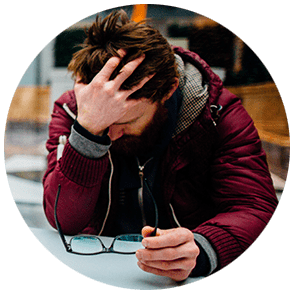South Florida Substance-Induced Psychosis Treatments
Mental health disorders can not only interfere with a person’s life, but they can also cause lasting emotional and physical damage. If you think your loved one is struggling with a mental health disorder, it is important to get them to help, especially if they could be suffering from a substance-induced psychotic disorder and their physical well-being is at stake. Luckily, Banyan offers several adult mental health services that can help.
What Is Substance-Induced Psychotic Disorder?
Substance-induced psychosis disorder is a mental illness characterized by a series of psychotic episodes that are presumably brought on by substance use. There are both drug-induced psychosis and alcohol-induced psychosis. The psychotic episodes often include abnormal thinking, hallucinations, and a disconnect from reality. Substance-induced psychosis can occur for a variety of reasons, such as taking too much of a substance, mixing substances, or withdrawal, but it is usually the result of an underlying mental health problem that is exacerbated by drug or alcohol use.
Unfortunately, psychosis is often related to a high risk of suicide, with 18.4% of first-episode patients attempting self-harm or suicide.1 Treatment of substance-induced psychosis is like dual diagnosis treatment and involves stopping substance use and addressing any underlying mental health problems.

Symptoms of Substance-Induced Psychosis
A person who is struggling with substance-induced psychosis will present various symptoms related to psychosis because of substance use.
Some common substance-induced psychotic disorder symptoms include:
- Irregular thoughts
- Poor psychomotor behavior
- Hallucinations – perceptions of something that is not actually there
- Delusions – false beliefs
- Paranoia
- Dissociation – disconnect from the real world
- Alexithymia – lack of emotions or emotional expression
Substance-induced psychosis treatment should be done immediately because psychotic episodes often require hospitalization to keep the person from harming themselves. A medical professional will also need to determine if the psychotic disorder is related to substance use.
What Drugs Cause Psychosis?
Many substances can cause psychosis, either while the user is high or after prolonged usage. Cocaine and amphetamine stimulants, such as methamphetamine, are widely known for their ability to cause psychotic symptoms. Hallucinations, delusions, paranoia, and disordered thinking are all possible effects of these drugs. LSD, psilocybin mushrooms, and phencyclidine (PCP), among other hallucinogens, can also result in transitory psychotic experiences, which are frequently characterized by severe perceptual distortions and altered states of consciousness.
Especially in high doses or by those who are already predisposed, cannabis use can potentially hasten the onset of psychosis. Long-term cannabis usage is associated with a higher risk of acquiring psychotic diseases, including schizophrenia, according to studies. Although the precise mechanism is not entirely known, it is thought that the psychoactive component of cannabis, THC (delta-9-tetrahydrocannabinol), can affect the neurotransmitter systems of the brain and cause psychosis in susceptible people.
Additionally, specific dissociative anesthetics like ketamine and synthetic cannabinoids (commonly referred to as "spice" or "K2") can produce psychotic symptoms. Both these substances and some prescription medicines are frequently abused. Always keep in mind that basic psychotic disorders like schizophrenia have a complicated etiology combining genetic, environmental, and neurochemical factors. The psychosis brought on by substance abuse differs from these diseases. However, taking some drugs can significantly increase the risk of experiencing either brief or lengthy psychotic episodes.
How Long Does Substance-Induced Psychosis Last?
Substance-induced psychotic episode length can depend on several factors, including the kind and quantity of the substance consumed, a person's personality, and any underlying mental health conditions. Substance-induced psychosis frequently resolves after a few days to a few weeks of ceasing to use the substance. However, in some situations, it might persist for a longer time.
Prioritizing the person's safety and well-being is crucial throughout the duration of a substance-induced psychotic episode. Medical intervention can be required in extreme circumstances where the symptoms worsen or persist. This may entail a stay in the hospital for close observation, the administration of medications to treat symptoms, and supportive therapy to address underlying problems. To prevent recurrence and advance long-term recovery, it is also crucial to address the underlying causes of substance abuse once the acute period of substance-induced psychosis has passed.
Substance Abuse-Induced Psychosis & Addiction Treatment
Although psychotic disorders and substance-induced psychotic disorders have similar symptoms, they are distinct mental health disorders and require different treatments. At Banyan Mental Health, our medical professionals will perform a full psychological and physical assessment to determine the best mental health treatment for each patient.
As a member of the Banyan family of rehabs, we provide substance abuse-induced psychosis and addiction treatment so that patients can address both the psychotic symptoms as well as the substance abuse problems that are causing them. During their time at our residential mental health facilities in Boca, patients will not only have 24-hour support to battle their substance abuse disorders, but they will also spend much of their day in programming that is focused on addressing their poor mental health.
These therapies range from holistic to evidence-based practices with trained mental health professionals that will be tailored to the patient’s specific substance-induced psychosis treatment plan. Patients will also have a designated therapist to talk to individually and group therapy sessions where they can connect with peers facing similar issues.
If someone you love needs substance-induced psychotic disorder treatment, do not wait to get help. Psychotic episodes can put your loved one in danger, so treatment for these disorders should be done sooner rather than later. Contact us today to learn more about how to start the process.
Sources:
- BMJ Journals – High rates of suicide attempt in early-onset psychosis are associated with depression, anxiety and previous self-harm
Related Readings
Can Grief and Loss Lead to Mental Illness?
The Importance of Medical Care During Dual Diagnosis Treatment




